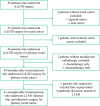Evaluation of Short-Term Postoperative Outcomes of Lateral Lymph Node Dissection After Neoadjuvant Radiotherapy for Rectal Cancer Patients: The Early Learning Phase After Surgical Training in the Netherlands
- PMID: 40338423
- PMCID: PMC12317899
- DOI: 10.1245/s10434-025-17155-6
Evaluation of Short-Term Postoperative Outcomes of Lateral Lymph Node Dissection After Neoadjuvant Radiotherapy for Rectal Cancer Patients: The Early Learning Phase After Surgical Training in the Netherlands
Abstract
Background: Distal, locally advanced rectal cancer might spread to lateral lymph nodes (LLNs), posing a risk of lateral local recurrence (LLR). This study evaluated quality-controlled implementation of lateral lymph node dissection (LLND) in the Netherlands.
Methods: This retrospective multicenter cohort study included consecutively treated rectal cancer patients who underwent neoadjuvant therapy, total mesorectal excision (TME) surgery, and nerve-sparing minimally invasive LLND by trained surgeons across 10 Dutch hospitals. Training involved cadaver sessions, monthly video meetings, and proctoring. Outcome measures included intra- and postoperative complications, urogenital dysfunction and 18-month LLR, local recurrence (LR), and disease-free survival (DFS).
Results: The study comprised 41 patients (median follow-up period, 16 months; interquartile range, IQR, 8-21 months) with advanced tumors (27% cT4, 49% cN2, 7% cM1), and a mean LLN size of 11 mm on primary-staging MRI. Abdominoperineal resection was performed for 29 patients (70%). A beyond TME procedure was performed for 11 patients (28%). The median blood-loss was 250 ml (IQR, 100-400 ml), with obturator nerve injury reported in one patient. Malignant LLNs were found in 41% of the LLND specimens. Complications occurred for 22 patients (54%), 21% (9/41) of which were grade 3 or higher. Nine patients (22%, four of whom underwent beyond TME surgery) had a Foley or intermittent urinary catheter at the end of the follow-up period. Sexual dysfunction of three patients was reported. No ipsilateral LLRs occurred. The 18-month LR rate was 14%, and the DFS was 55%.
Conclusion: Minimally invasive nerve-sparing LLND by trained Dutch surgeons showed acceptable complication rates and good oncologic control of the lateral compartment to date.
© 2025. The Author(s).
Conflict of interest statement
Disclosure: The authors declare that they have no conflict of interest.
Figures



References
-
- Steup W, Moriya Y, Van de Velde C. Patterns of lymphatic spread in rectal cancer: a topographical analysis on lymph node metastases. Eur J Cancer. 2002;38:911–8. - PubMed
-
- Sluckin TC, van Geffen EG, Hazen S-MJ, Horsthuis K, Beets-Tan RG, Marijnen CA, et al. Prognostic implications of lateral lymph nodes in rectal cancer: a population-based cross-sectional study with standardized radiological evaluation after dedicated training. Dis Colon Rectum. 2024;67:42–53. - PMC - PubMed
-
- Ogura A, Konishi T, Cunningham C, Garcia-Aguilar J, Iversen H, Toda S, et al. Neoadjuvant (chemo) radiotherapy with total mesorectal excision only is not sufficient to prevent lateral local recurrence in enlarged nodes: results of the multicenter lateral node study of patients with low cT3/4 rectal cancer. J Clin Oncol. 2019;37:33–43. - PMC - PubMed
-
- Ogura A, Konishi T, Beets GL, Cunningham C, Garcia-Aguilar J, Iversen H, et al. Lateral nodal features on restaging magnetic resonance imaging associated with lateral local recurrence in low rectal cancer after neoadjuvant chemoradiotherapy or radiotherapy. JAMA Surg. 2019;154:e192172-e. - PMC - PubMed
-
- Akiyoshi T, Ueno M, Matsueda K, Konishi T, Fujimoto Y, Nagayama S, et al. Selective lateral pelvic lymph node dissection in patients with advanced low rectal cancer treated with preoperative chemoradiotherapy based on pretreatment imaging. Ann Surg Oncol. 2014;21:189–96. - PubMed
Publication types
MeSH terms
LinkOut - more resources
Full Text Sources
Medical
Miscellaneous

